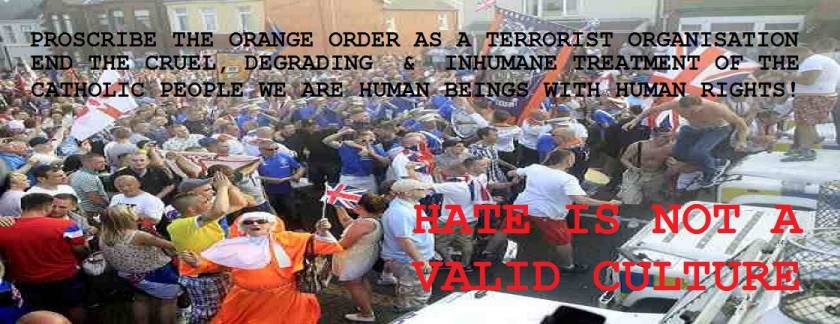Orangemen do not like being arrested, not just because nobody likes being arrested but because they consider themselves to be respectable pillars of society.
THE PSNI has accused the Orange Order of “reckless” and “inflammatory” statements leading up to this year’s Twelfth violence. During the flag protests, Chief Constable Matt Baggott was vocal about the tragedy of vulnerable young people acquiring criminal records for rioting.
The PSNI can square this circle by arresting senior members of the Orange Order for incitement. Arrests are apparently on the cards. Speaking to The Irish News, a police source said “absolutely everything” is under consideration, including anti-terrorist legislation aimed at Islamic hate-preachers. However, there is no need to risk such an innovative approach when a straightforward offence is available. Incitement has been known since 2007 as “encouraging or assisting crime“. Jamie Bryson has been charged with. Breaching a restriction imposed by the Parades Commission is specifically listed in the law as one of the crimes it is an offence to encourage. Encouragement may include any act or failure to act with the intent and belief that a crime will be committed. Interestingly, the law says this can be proven if an act was merely “reckless”. Prior to last Friday’s return parade past Ardoyne, the Orange Order called for the Parades Commission to be “no longer recognized, acknowledged or engaged with by any member of the unionist community”. There is clearly a case to be made that this and similar statements encouraged breaching parades restrictions, giving that the Orange Order was about to embark on several hundred parades and the Parades Commission is the lawful regulatory body.
The Orange Order (disorder) claims no restrictions were breached by its protests, although the PSNI disagrees. However, this is beside the point and there is no need to get into the debate about when a protest becomes a parade. The law states that a crime does not have to take place for the offence of encouraging that crime to take place. All that counts is that the person doing the encouraging intended and believed the crime would occur. The punishment is the same as the crime encouraged, which in the case of breaching a Parades Commission restriction is up to six months imprisonment. It is less clear whether senior Orange men could be charged with encouraging public disorder, an offence that would attract several years in prison. The Orange Order said trouble was “inevitable” after the Parades Commission ruling on Ardoyne, which shows belief. But the law says an act is not encouragement solely because of its “foreseeable consequences”, so intent must be proven ass well. This is where the “reckless” provision might apply. Immediately before last Friday’s violence, senior Orangemen made speeches about “culture war”, ongoing war with the Protestant and unionist people”, “fighting the war on today’s battleground” and “waking us from our slumber”. They called on “this generation not to be found wanting” and warned that until three north Belfast lodges restricted by the Parades Commission had “got home, the rest of Twelfth day isn’t over for everyone else”. Then they sent those lodges and their followers up to police lines at the North of Ireland‘s most explosive interface.
Many people would say that was reckless with regard to whether or not violence would result, no matter how many mentions of “peaceful protest” accompanied the blood thirsty rhetoric. A good barrister could certainly make a case either way. The threshold for inciting public disorder can be surprisingly low for those not protected by the magical properties of a sash. One of the first people to appear in court after last weekend’s disturbances has been charged with “making obscence hand gestures with intent to provoke a breach of the peace”. This charge is not based on the encouragement llegislation but it still seems remarkable that senior Orange men can raise a metaphorical finger to the law around a flashpoint parade without suffering or expecting to suffer any legal consequences. Orange men do not like being arrested, not just because nobody likes being arrested but because they consider themselves to be respectable pillars of society. A perp walk is the one walk the Grand Wizards can never imagine themselves doing. The psychological effect of being put before a judge for their actions would be highly significant. If the PSNI is afraid of provoking trouble, that sail has sailed. When facing a politically awkward arrest the PSNI has been known to claim, quite wrongly, that it cannot act without receiving a complaint. So perhaps a few complaints would help matters along. Residents and represtatives might care to explore that option.
With many thanks to : Newton Emerson, The Irish News.
Email address: newton@iiris news.com
Related articles
- Orange Order to Hold Protest in Woodvale (belfastdaily.co.uk)
- Orangemen will march to police lines in north Belfast every week (seachranaidhe1.wordpress.com)
